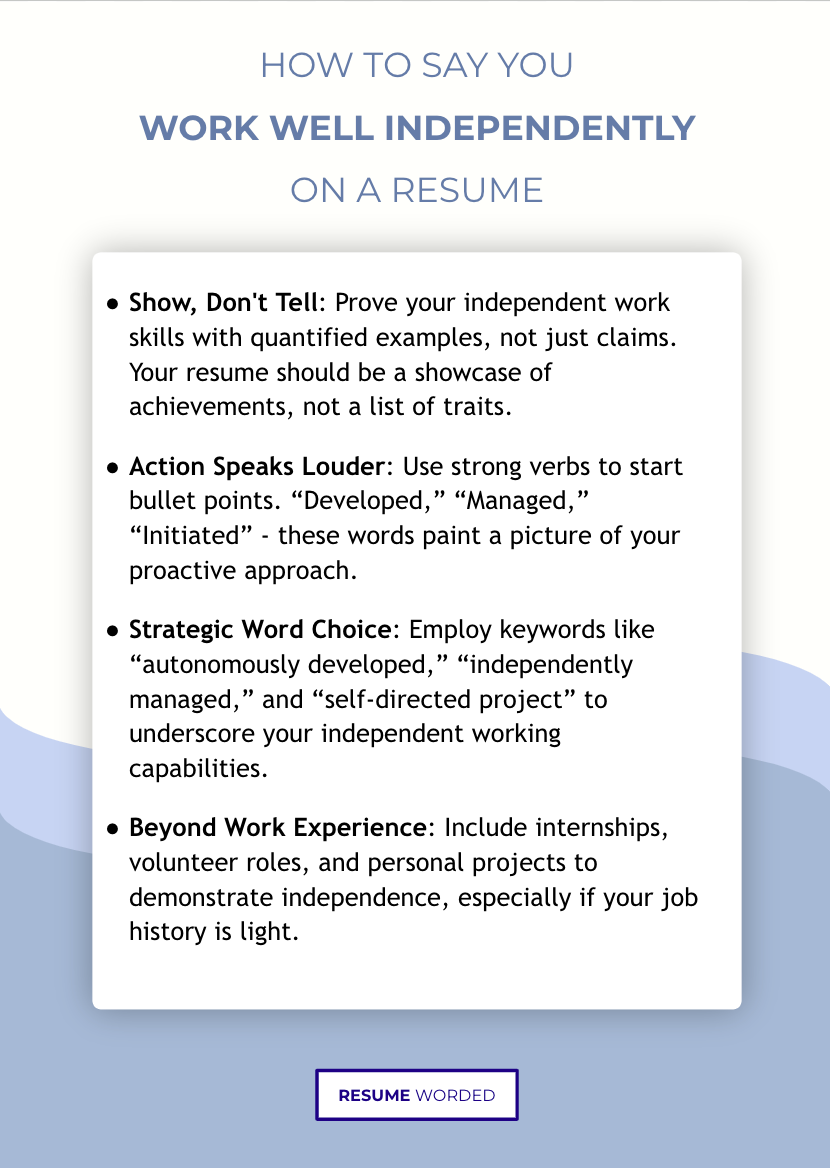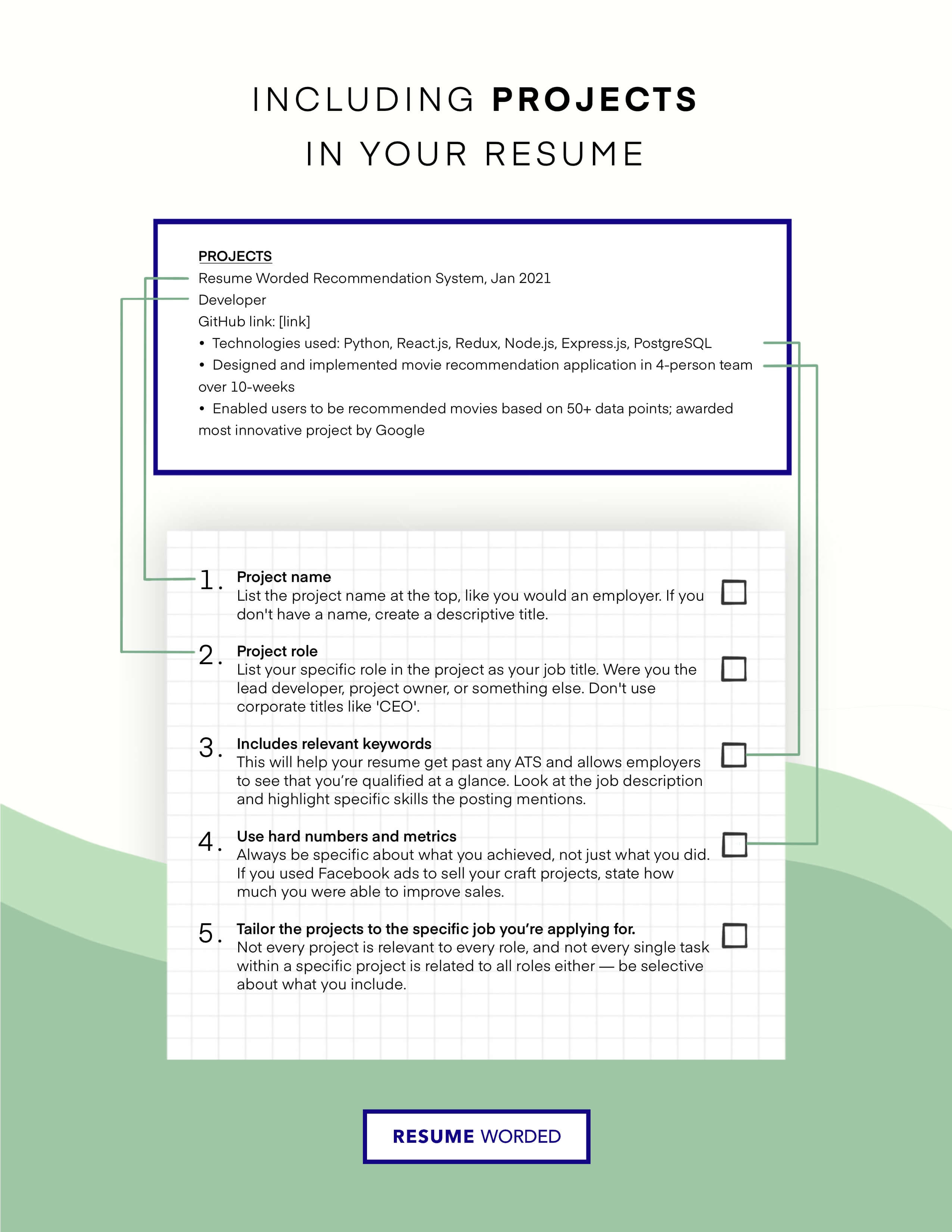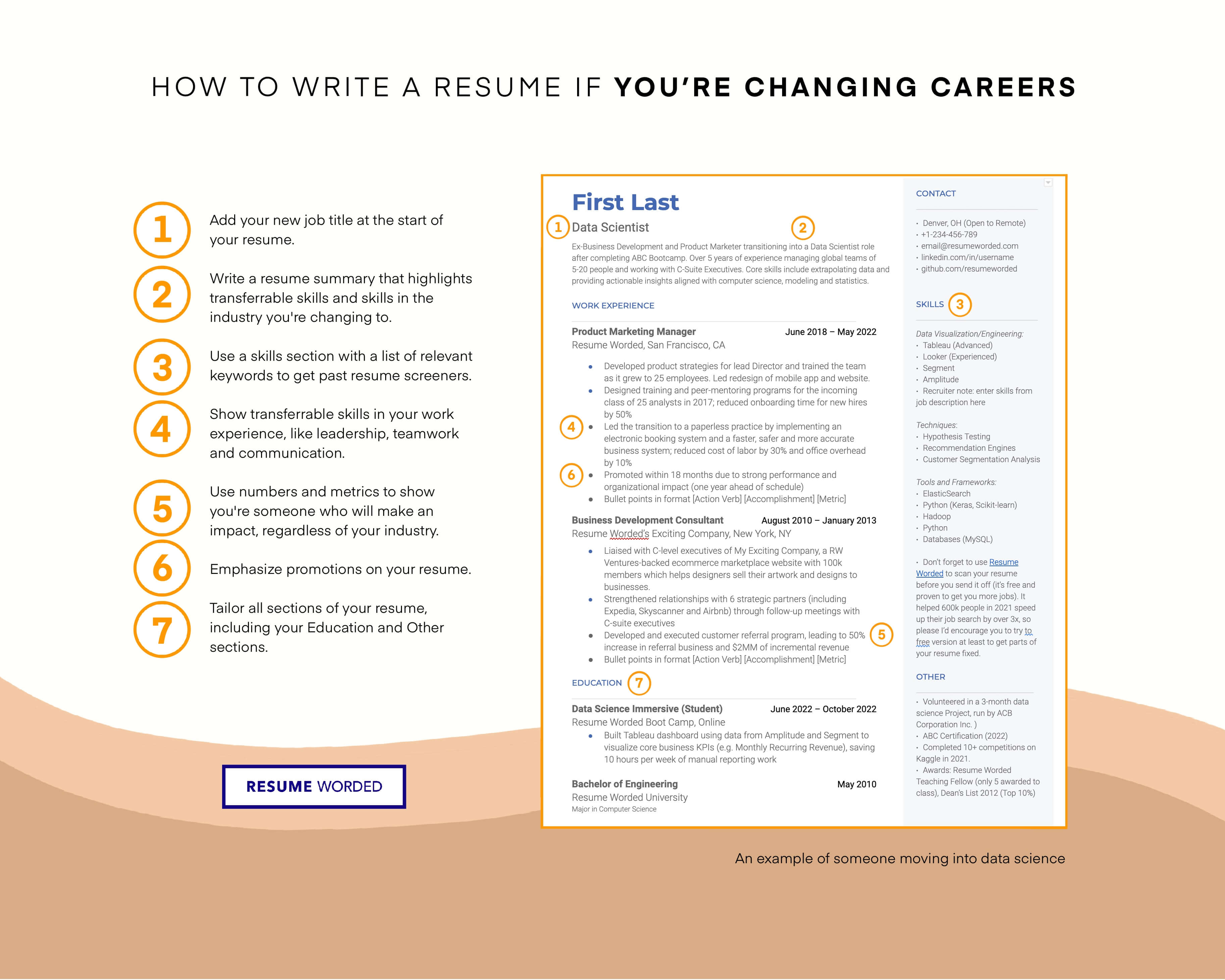“I have the ability to work independently with minimal supervision …”
Even if it’s true, a statement like this on your resume is more likely than not to get it thrown on the trash pile. Hiring managers love independent workers — but they hate seeing soft skills on a resume with no evidence to back them up.
The solution? Don’t just say that you can work independently — prove it! In this guide, we’ll cover:
- Examples of what to include on your resume to show you can work independently
- How to say that you work well independently (without coming right out and saying it)
- Essential skills for independent workers
- Tips to keep in mind when listing soft skills in your resume
- Sample bullet points for working independently

A quick-start guide to showing your ability to work independently on a resume
Short on time? Here are the essentials you need to know about showing you’re an independent worker on your resume:
- Include project and tasks from times when you’ve worked independently
- Add internships, volunteer work, and extracurricular activities if you don’t have enough independent work experience.
- Start your bullet points with a strong action verb — ideally, one that speaks to your ability to work independently.
- Include clear metrics or results whenever possible.
- Show independent work and related soft skills through your accomplishments — never in your skills section.
- Get instant expert advice by uploading your resume to an ATS resume scanner.
Where to list your ability to work indipendantly on your resume
The best place to describe your indipendant skills on your resume, is in your work experience section, since that’s the part recruiters care about the most. If you’re new to the workforce or just struggling to come up with relevant examples, you don’t need to restrict your examples to traditional work experience — they can also include internships, volunteering, extracurriculars, and freelance or contract work.
Just like other soft skills, your ability to work independently is a skill that recruiters do not want to see listed in your skills section, instead they want to see what you have accomplished with this skill. A good way to check if you have shown your ability to work independently through your accomplishments and bullet points is to upload your resume to the tool below – it'll let you know if your resume highlights independent work as well as your other relevant achievements.
How to demonstrate your ability to work independently on your resume
As mentioned above, showing you can work independently isn’t about simply saying you can. It’s about showing you can, though quantified, well-chosen examples that demonstrate your skills and support your claims.
Choose the right experience
When deciding what work experience best demonstrates your independent skills, look for roles when you not only worked independently but when you achieved something successful, significant, and quantifiable while working on your own. This could include:
- Working alone on a successful task or project
- Multitasking or working on several projects at once
- Taking point on a high-stakes or high-profile task
- Working on a task outside of your normal comfort zone/duties
- Any time when you had to be your own boss, e.g. if you ran your own business, took on a high-level interim role, or were without leadership for an extended period
Here are some ideas and examples you can use to highlight the success of your independent work:
Mention deadlines and targets
Mention projects that were completed on target or ahead of schedule to demonstrate the successful impact of your work. Highlight how your independent decision-making and proactive approach directly led to the project’s success.
Managed a team project autonomously, employing effective delegation and resource management, resulting in project completion two weeks ahead of schedule.
Focus on remote work
Remote work is a highly competitive skill in today’s job market, and by default, it showcases a variety of independent skills and expertise. Describe successfully managing remote projects or working autonomously in a virtual environment.
Coordinated and led a virtual team across three time zones to deliver a marketing campaign, navigating remote communication challenges and ensuring timely delivery.
Include personal and professional projects
Describe self-started initiatives or projects, both at work and in your personal life, that showcase the positive impact of your involvement and your ability to spearhead ideas.
Initiated and executed a cost-reduction program, autonomously researching and implementing sustainable practices that reduced expenses by 15%.
Spearheaded the development of a new client onboarding process, independently researching, designing, and implementing the strategy, resulting in a 30% increase in client retention.
Use action verbs
“Worked independently on …” might seem like a good way to describe working independently, but it says very little about what you actually did. Instead, start your phrases with a strong action verb to make a more memorable statement and explain your skills n more detail.Try some of these resume action verbs to boose the impact of your work experience bullet points:
- Developed
- Introduced
- Generated
- Devised
- Implemented
- Initiated
- Established
- Produced
- Planned
- Investigated
- Conceived
- Resolved
- Researched
- Scheduled
- Organized
Demonstrate independence through keywords and phrases
Keywords are integral to resume success. Not only do they impress recruiters, but they’re also the key to getting past automated ATS systems. When a role requires independent experience, recruiters will be scanning your resume looking for these key phrases. So include them whenever you can:
- Independently managed: Indicates that you were solely responsible for handling a task or project. For example, "Independently managed a team of 10 in developing a new software application."
- Solely responsible for: Highlights that you were the single point of accountability. For example, "Solely responsible for orchestrating the annual corporate event."
- Self-directed project: Suggests a project that was completed with minimal supervision or independently overseen by you. Example: "Led a self-directed project to improve customer service protocols."
- Autonomously developed: Demonstrates the ability to create or build something independently. For example, "Autonomously developed a new inventory tracking system."
- Initiated and executed: Shows taking the lead and following through on a project or task. For instance, "Initiated and executed a marketing strategy that increased sales by 30%."
- Led independent research: Indicates carrying out research initiatives on your own. Example: "Led independent research into market trends, informing product development."
- Single-handedly implemented: Highlights the individual accomplishment of implementing a plan or idea. E.g., "Single-handedly implemented a new CRM system across the organization."
- Pioneered: Suggests being the first to undertake a particular task or project. For example, "Pioneered a digital transformation initiative."
- Drove project to completion: Indicates leading a project through to its end. Example: "Drove project to completion ahead of schedule, resulting in a 20% increase in efficiency."
- Managed entire lifecycle: Indicates overseeing every phase of a project independently. Example: "Managed the entire lifecycle of the product development process."
- Conceived and implemented: Shows both the initial and execution phases of a project, which you can then discuss in terms of your independent role. For instance, "Conceived and implemented a new user feedback system which achieved a 15% increase in user engagement."
Examples of how to show you can work independently on a resume
Stuck on exactly how to word your resume accomplishments? Here are some tried and tested examples of indipendant work from successful resumes to get you started.
Paid work experience
If you often work independently as part of your regular work experience, this should be fairly straightforward. Choose a handful of examples that show your ability to work independently in different contexts; for example, choosing your own tasks, managing your own workload and priorities, seeking solutions to problems on your own, and proactively communicating your progress without needing someone else to check in on you.Here are some examples:
Sustained 95% on-time completion rate for software tests by effective team management and work balance.
Created weekly and monthly project status reports for various stakeholders, highlighting key constraints, if any, and ensuring timeliness of project deliverable, resulting in over 95% customer satisfaction rate.
Virtual and remote work
In today's evolving job market, where remote and virtual work has become far more common, employers are actively looking for candidates who can thrive in a remote environment.
To highlight independent skills in remote work, discuss when you successfully managed projects or tasks remotely and emphasize how your work directly contributed to positive outcomes. Use specific examples that show your proactive approach, ability to handle challenges without direct oversight, and problem-solving skills in a remote setting.
Here are some examples:
Spearheaded a remote team project, enhancing client satisfaction by 30% through innovative strategies and self-directed execution.
Independently managed a virtual marketing campaign, resulting in a 20% increase in online engagement.
Internships
If you’re still in school or only graduated recently, you can treat internships the same way as you would any other kind of work experience, including listing them in your regular experience section. While you may have had more supervision than other types of jobs, you can still choose accomplishments that show what you did on your own or without needing to be told.
Here are some examples:
Secured and surveyed 18 websites with 0 primary attacks in the first month on the job.
Implemented regular monitoring of network performance, reducing network downtime by 11% through quicker responses.
Projects, volunteering, and extracurriculars
Don’t have a lot of work experience to use as an example? That’s okay — personal or educational projects, volunteer positions, and even extracurricular activities can all be used instead.Here are some examples:
Worked to build out the networking infrastructure for a local education charity as they began expansion to the west coast.
Used sci-kit learn in Python to simulate possible outcomes under different scenarios while also applying JavaScript/Python.
Freelance and contract work
Listing freelance work on a resume is an excellent way to show that you can work independently with minimal supervision. Stick to accomplishments that are relevant to the job you’re applying for and that highlight your ability to take initiative and get results.Here are some examples:
Collaborated with over 3K clients to determine project scopes, set milestones, and agree on payment terms.
Provided responsive and professional support to 8K existing clients and developed 900 new relationships within 4 months.
Showcasing independence: Before and after examples
To effectively showcase independence on your resume, it's crucial to transform vague statements into impactful phrases that highlight autonomy and successful outcomes. Let's explore how to revamp some underperforming resume statements to focus on successful independent work.
Example 1
Before: Handled customer inquiries.This phrase is vague and doesn't mention or highlight independent skills. To improve it, add specific details and quantifiable outcomes, and start with an action verb to demonstrate autonomy in handling tasks.
After: Independently managed a high volume of customer inquiries, resolving 95% of issues on first contact and improving customer satisfaction ratings by 25%.
Example 2
Before: Participated in team projects.This phrase lacks detail about the role played in the project and fails to explain how the project showcases independent work. To fix this, focus on your individual contribution, emphasizing your independent responsibilities within the project setting.
After: Contributed to team projects by autonomously developing and implementing a new data analysis method, leading to a 15% increase in project efficiency.
Example 3
Before: Responsible for sales targets.This phrase mentions a generic job responsibility and does not showcase how targets were met independently. To improve its impact, highlight specific independent actions to meet or exceed targets, and quantify the result with metrics.
After: Exceeded sales targets by 20% through self-initiated strategies, including personalized client outreach and independent market analysis.
Soft skills that show you can work independently
Working independently involves a host of related skills. To show hiring managers that you have the skills to be an independent worker, your resume should include evidence of:
- Self motivation
- Organization
- Problem solving
- Time management
- Work ethic
- Integrity
- Communication
- Initiative
- Research
- Goal setting
- Troubleshooting
Much like working independently, these are all soft skills that don’t belong in your skills section. Instead, think of examples of when you used these skills in a professional context. Bonus points if you can combine them to paint a picture of exactly how well you work independently — for example, working alone on a tight deadline involving valuable assets shows independent work, time management, and integrity.
If you’re not sure which skills to include in your skills section, use the skills search tool below to search for the job you’re applying for. It’ll give you a list of hard skills relevant to the job.
Do’s and don’ts of saying you can work independently on a resume
Here are some key tips to keep in mind when writing your resume and some common resume mistakes to avoid:
DO choose accomplishments that clearly show your ability to work independently. Try to be as specific as possible — the more information recruiters have, the more easily they can picture you in the role.
DO tailor the examples you choose to each application, and ensure your experience is directly relevant to the job you’re applying for.
DO have a few examples of times when you’ve worked alone or with minimal support ready to go for when you reach the interview stage.
DON’T overemphasise how you prefer to work independently. Even if solo work is a big part of the job, it may raise red flags about your ability to get along with others or work as part of a team when necessary.
DON’T explicitly say that you can work well independently. Hiring managers don’t put much stock in self-assessment, which means it’s a waste of space at best.
DON’T just write “independently” at the start of every bullet point — generally, you should avoid using adverbs on your resume at all.
DON’T use vague language. General and non-specific statements like "Handled customer inquiries" fail to demonstrate your independent skills and achievements effectively.
DON’T list soft skills, like independence, in your skills section. This takes up valuable space on your resume and doesn’t add any relevant information. Instead, show soft skills through quantified examples.










